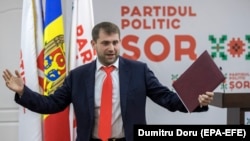Welcome to Wider Europe, RFE/RL's newsletter focusing on the key issues concerning the European Union, NATO, and other institutions and their relationships with the Western Balkans and Europe's Eastern neighborhoods.
I'm RFE/RL's Europe Editor Rikard Jozwiak, and this week I am drilling down on two major issues: the EU mulling restrictive measures on Georgia and hitting Moldova’s pro-Moscow opposition with sanctions.
Briefing #1: The EU Weighs Up Georgia Sanctions
What You Need To Know: As EU foreign ministers gather in Brussels on July 15 for their last official meeting before the summer break, Georgia is once again high on the agenda due to the deteriorating political situation in the South Caucasus republic with the recent arrests of several opposition politicians.
After briefly being discussed by ministers last month, the situation in the country is now a major discussion point -- and more decisive action may be taken this time.
The bloc has so far enacted some symbolic measures against Tbilisi.
In early 2025, Brussels imposed visa requirements on Georgian diplomatic passport holders. It has also refrained from holding high-level political meetings and diverted EU funding from Georgia’s government to civil society.
Deep Background: The most pressing issue this time is whether the bloc -- with the unanimous approval of all 27 member states -- manages to impose any sanctions.
There have been attempts before, notably in January, when the EU foreign policy chief Kaja Kallas wanted to slap visa bans and asset freezes on 13 individuals linked to the Georgian Dream party for a crackdown on opposition protesters.
Back then, Hungary and Slovakia vetoed any such moves, and sanctions talks stalled in Brussels for a while.
EU officials have in recent weeks also discussed the possibility of blacklisting a couple of people responsible for what an internal EU document seen by RFE/RL calls the “instrumentalization of the justice system by the Georgian authorities.”
This would occur under the “EU global human rights sanctions regime” -- a sanctions framework similar to the US Magnitsky act that already includes more than 100 human rights abusers from various countries, such as China, Libya, Russia, and Sudan.
According to several EU officials familiar with the discussions, more than 10 EU member states -- including France, the Netherlands, Poland, Austria, Sweden and the Baltic trio of Estonia, Latvia and Lithuania -- have been pushing for sanctions to be adopted by EU foreign ministers.
Just like in January, Bratislava and Budapest have been resisting the move, arguing that any type of restrictive measure could worsen the situation and that dialogue with Tbilisi is a better approach.
While not siding with Slovakia and Hungary, Greece has been arguing against taking any hasty decisions.
Despite the obvious opposition, many diplomats RFE/RL has spoken to on condition of anonymity believe that there still is a chance of finding a consensus to blacklist at least a couple of Georgian judges, whom the EU deems responsible for the arrest of Georgian oppositionists. It’s believed that sanctions-skeptic countries may accept this instead of targeting high-profile politicians.
Drilling Down
- So, what other options are being discussed? The most obvious one is to suspend visa liberalization for Georgian citizens -- a move that only requires a qualified majority of 55 percent of member states representing 65 percent of the total EU population.
- Sweden is the latest country to push for this, arguing that it can be done temporarily if the situation continues to worsen after Georgian local elections in early October. This view is apparently also supported by the Baltic states, Denmark, France, and Poland.
- Others have expressed reservations, however -- notably Greece and Slovenia. They argue that such a radical move -- with the bloc never having suspended visa liberalization for an EU candidate country before -- should be taken as an absolute last resort.
- It has also been pointed out that such a step would likely have more of a negative impact on ordinary Georgian citizens rather than the country’s leadership. Another alternative proposal put forward by the European Commission is to impose national entry bans on certain individuals.
- This is regarded as a somewhat “softer measure” compared to imposing a blanket suspension of EU visa liberalization or broader sanctions. However, it would only be effective if several member states chose to adopt and coordinate this approach.
- Whether that will happen remains uncertain, as some countries -- such as Bulgaria, Greece, Italy, and Romania -- have stressed that it still is important to keep communication channels open with Tbilisi.
- The internal EU document also mentions the possibility of suspending Georgia’s candidate status, which the bloc unanimously bestowed on the country back in December 2023. The EU, however, has never before unilaterally reversed candidate status in its history (Iceland asked Brussels to remove its EU candidate status back in 2015). Once again, unanimity would be necessary to take this step.
- Finally, there is an option that could likely be achieved this week: a large group of countries, led by the Baltic trio, plans to ask the European External Action Service and the European Commission to conduct a thorough assessment of the EU-Georgia Association Agreement from 2016.
- The goal would be to explore the possibility of suspending parts of the agreement in the future, such as the free trade provisions it includes. Such a suspension would require only a qualified majority.
Briefing #2: Brussels Tightens Stance On Moldova’s Pro-Russian Opposition
What You Need To Know: EU foreign ministers on July 15 are expected to rubber stamp an agreement to impose sanctions on people and entities the bloc deems guilty of “actions destabilizing" Moldova, where Russia still wields massive influence and maintains more than 1,000 troops in the separatist Transdniester region.
The sanctions regime was first adopted in 2023 in an attempt to protect Chisinau from Moscow-backed attempts to wrestle back political control over the country.
So far, 16 people and two organizations are blacklisted, most notably the fugitive oligarchs Vlad Plahotniuc and Ilan Shor, both of whom fled Moldova.
The proposed new batch of listings, seen by RFE/RL, consists of seven individuals and three entities -- all in one way or another linked to Shor.
Deep Background: The Russia-based Shor, whom the Moldovan police believe was responsible for a vote-buying scheme last year that nearly swung the referendum on future EU membership in the Eastern European republic, was a key figure in bank fraud scandal a decade ago in which close to $1 billion was transferred out of Moldovan banks for loans that remained unpaid.
Shor’s political party SOR was outlawed in 2023, but a year later he launched a new political bloc from Moscow called Victory/Pobeda, which is one of the three entities proposed for sanctioning by the EU.
The official sanction text notes that “the Victory/Pobeda Political Bloc is involved in spreading false information and in vote-buying schemes” during both the referendum last year and the presidential election that returned the pro-EU President Maia Sandu to office.
Shor’s company A7 is also listed.
Described by Brussels as a firm “established by Ilan Shor, together with multiple financial companies in Moscow, partnering with Russian state entities” it stands accused of being the vehicle used by him to buy votes.
A7 has also been accused of helping facilitate cross-border financial transfers for Russian clients in the face of Western sanctions.
The third entity on the list is the “Cultural Educational Centre of Moldova” which according to the EU was distributing free vouchers to voters transported to a Moscow polling station, “while simultaneously promoting the ‘Card of the Citizen of the Republic of Moldova' in the Russian Federation’ propaganda program.”
This was, according to the bloc, another activity that Shor and his associates were behind.
Drilling Down
- Another Individuals on the list also appear to be linked to Shor. Alexandru Beșchieru is the leader of the Forța de Alternativă și de Salvare a Moldovei (Alternative and Salvation Force of Moldova) political party, which is one of the successors of the SOR party and now finds itself under the umbrella of the Victory/Pobeda political bloc.
- Victoria Furtuna, the leader of the Moldova Mare (Greater Moldova) party, is another who allegedly has benefited from Shor’s patronage. Moldovan members of parliament Alexandr Nesterovschi and Irina Lozovan, both of the Renastere (Revival) party which is perceived to be yet another successor of the SOR party, are also proposed for blacklisting.
- The pair were sentenced earlier this year to 12 and six years in prison, respectively, for illegal financing of political parties. Both disappeared after their convictions, with Chisinau authorities believing that they currently are hiding in the breakaway Transdniester region.
- The leader of the Renaissance party, Natalia Parasca, is also included in the EU document with the bloc pointing out that she is a member of the board of the already sanctioned entity Evrazia, which according to the files is “actively involved in the illegal financing schemes” of Shor. Vadim Grozavu, leader of the Victory Party and Alexei Lungu, who heads the Chance Party, are also to be blacklisted.
- The EU sanctions do not, however, include the mayor of Chisinau, Ion Ceban.There was confusion on July 9 when the Romanian Foreign Ministry announced on its website that due to national security considerations, Bucharest had barred him from entering Romania.
- That the measure also included a ban on access to the EU’s Schengen area, which encompasses most EU countries as well as non-EU countries such as Iceland, Liechtenstein, Norway, and Switzerland.
- Ceban will be included in the Schengen Information System (SIS), which is a Schengen area database used for sharing information on border management and security, unless he appeals the decision.
- But that stops short of a full ban as individual European capitals can undercut the Romanian ban by issuing a visa to their country or simply just allowing him entry.
Looking Ahead
On July 16, the European Commission will present its first draft proposal for the next long-term EU budget (2028-2034).
The proposed budget of over a trillion euros ($1.2 trillion) will kick off a debate in Brussels that will drag on for months, as member states will fight among themselves over how much money should be spent on various items.
Perhaps the most interesting question will be how much money will go to EU foreign policy and enlargement, with the bloc expected to take in new members during the new budget period.
That's all for this week!
Feel free to reach out to me on any of these issues on X @RikardJozwiak, or on e-mail at jozwiakr@rferl.org.
Until next time,
Rikard Jozwiak
If you enjoyed this briefing and don't want to miss the next edition subscribe here.








